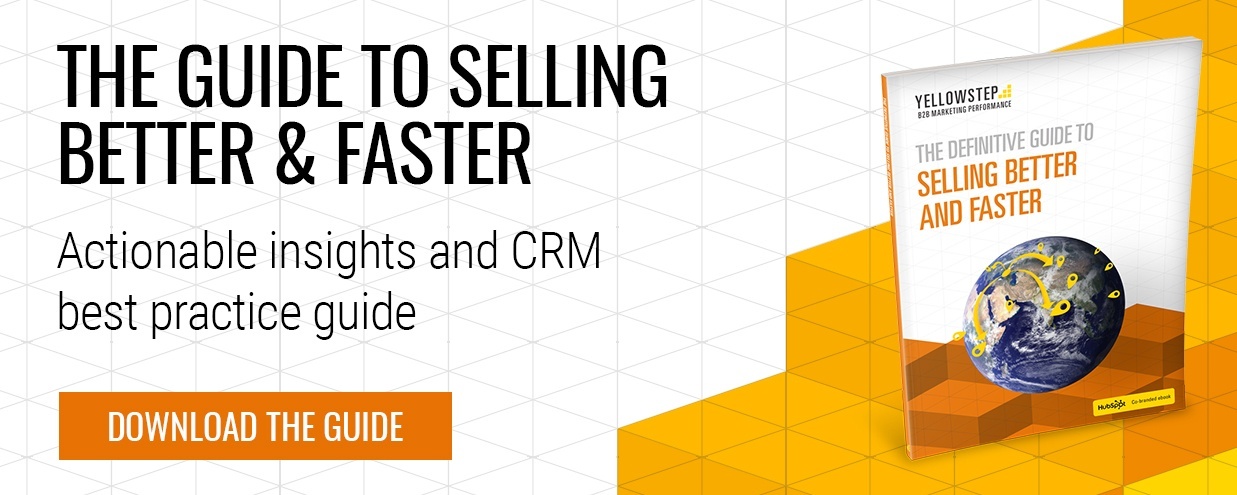'Always be closing’ has been a famous mantra across sales teams across the world for years. And for Sales Directors who lead a team who are struggling to make it happen, it can sound like the worst phrase in the world.
Bearing in mind you have solid personnel in place, we’ve put together some common reasons as to why your sales team aren’t closing their deals. They include:
- Low lead quality
- The wrong (or no) processes
- Little research on the prospect and their needs
- Not enough knowledge about the products and services
- Not asking the right questions
- Not asking for the sale
Let’s explore further:
Your lead quality is low
This is not just the fault of your marketing team. Marketing need to hear from sales to understand what the limited amount of information is for a salesperson to get in touch.
Enhancing marketing and sales communication can ensure that marketing aren’t producing hundreds of leads that are a complete waste of time for salespeople.
While it may take some time for sales and marketing directors to come together and work out a plan, it will be worth it with the improved sales results when your team receive good quality leads.
If you also invest in a platform that handles automated lead nurturing, you will ensure marketing are picking up some of the legwork to qualify leads who are actually interested.
You don’t have defined processes in place
Is your follow-up process documented and personalised depending on which persona you bring in? Or is your sales team adopting a ‘spray and pray’ approach?
You may want to map out a consistent process for your sales team to stick to, which should make it completely clear how much outreach you expect, and how it should be conducted. One possible example is:
Call 1 > Wait 2 days > Email follow-up 1 > Wait 2 days
Call 2 > Wait 2 days > Email follow-up 2 > Wait 2 days
Call 3 > Wait 2 days > Email follow-up 3.
A CRM system will also enable you to have full visibility of your database, as well as sent emails, automation sequences, and the sales and marketing lifecycle stages for each contact. You then have a clearer picture of where possible sales and falling through the gaps.
They do not know enough about the prospect and their needs
There’s nothing worse than receiving a cold call and being asked ‘...what do you guys do again?’ Instant turn-off!
Putting in the time and research to understand your contact is not only great to build trust and rapport, but it will also give you the fuel you need to personalise the sales call or email to the prospects pain points and needs.
According to Salesforce, 65% of business buyers say they’d switch brands if a company didn’t make efforts to personalise their communications, so it’s more important than ever for salespeople to get this part right.
They do not know enough about the products/services being sold
Perhaps just as bad (or worse) than receiving a call from someone who doesn’t know your business, is receiving a call from someone who doesn’t know their own business.
Buyers are usually well-informed, with research and information at their fingertips. You'll likely get found out if you don't know what you're selling.
Salespeople need to know all the ins and outs of their product just as much as your customer service people. How would you feel if you were passed from pillar to post when you try to find out some technical details behind a product or service? Not good, I’d bet!
Here's a quote from Yellowstep's Managing Director, Martin Broadhurst, on a recent sales experience:
"I recently received a sales call that went straight into an immediate pitch without any qualification or needs assessment. And the call went downhill from there!"
"He offered a product and pointed me in the direction of one of their case studies outlining what a previous client received. Within seconds, while still on the call, I fact-checked his claims about his offer and was able to tell him that what he said was wrong, and that he'd deceived his other clients! They hadn't received what he'd said they'd delivered."
"He hurriedly told me that he'd check with his manager who, begrudgingly, admitted I was right. By that time, the damage was done."
"That was a pretty awful sales experience, all because I knew more about their service more than they did."
They don’t ask the right questions
Salespeople need to ask great questions in order to create a tailored sales experience. But the trick is not to bombard with closed-ended questions - it’s to get the prospect to speak openly and candidly. Here are a few examples of questions an effective salesperson might ask:
- Do you have specific company goals? When the salesperson understands the prospect’s goals, they can eventually leverage their offer as an asset that can help them reach their goals better and faster.
- What obstacles do you think will keep your plan from working? This will allow your salesperson to uncover what the prospect doesn’t like about their current situation, and how your product/service fits into the picture as a solution.
- What programs do you already have in place to achieve what we’ve talked about? This question will allow your salesperson to uncover any competitor information, gain an insight into the current processes, and promote how their offering is different.
They don’t ask for the sale at the right time
Asking for the sale sounds terrifying for a number of salespeople, even though it’s the most important part!
With stats such as ‘50% of prospects think salespeople are pushy’, this is understandable. However, it is often the case that salespeople will be looking to close the moment they pick up the phone - offering the price and USPs without building rapport or focussing attention on the prospect's pain points.
As long as you’ve set up the process so that your prospect is qualified, warm, and sees the value in working with you, then why not avoid wasting everybody's time - ask for the sale!
the sales acceleration trio
Accelerating sales growth is not just about bringing the right people and processes together. A powerful use of technology in the shape of the right customer relationship management system (CRM) can help empower people, define process, and help you sell smarter and faster than ever before.
Download our free guide to selling better and faster, and introduce actionable insights and CRM best practices to your sales team today.
 By
By 